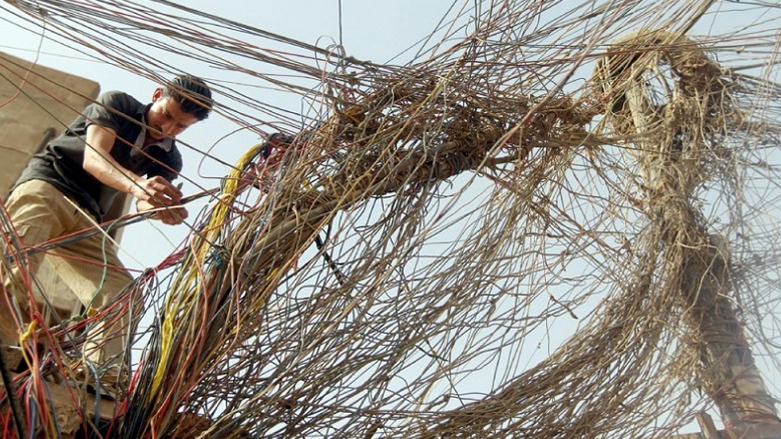Iraq claims it will maintain current electricity production throughout summer

ERBIL (Kurdistan 24) – Following a year in which Iraq saw months of violent protest sparked by chronic lack of services, Electricity Minister Luay al-Khateeb on Wednesday claimed his ministry would sustain current levels of electricity supplied to its power grid throughout the coming summer.
This would be made possible through the recent “completion of scheduled maintenance,” made well before temperatures climb, said Khateeb during a meeting with ministry staff, according to a statement from his office. He also affirmed the ministry’s commitment to supply power to “Baghdad and all the other provinces.”
Summer months in Iraq have proved to be the most trying times for Baghdad’s successive governments as they have struggled to provide consistent power in the sweltering heat to citizens who's increased summer use of air-conditioning and other appliances strains the grid's capacity.
Mass protests began last July in the city of Basra and spread across several southern and central provinces, including the capital, and resulted in at least dozens of deaths. Participants burned down multiple governmental and party offices over the next few months, notable among them Basra’s governorate building and Iranian Consulate.
In addition to demands for improved services, electricity primary among them, other central issues of the movement have been poor infrastructure, lack of employment, and government corruption. Organizers decry the low standard of living in the oil-rich province, the petroleum exports from which account for over 90 percent of the nation’s total revenue.
Discontent has continued to smolder in the province and demonstrations have periodically regained momentum. As recently as March 7, security forces used tear gas, batons, water cannons, and arrests to break up mostly young protesters.
With all eyes on Basra as temperatures rise, this summer could prove a crucial test for Prime Minister Adil Abdul-Mahdi and significantly affect the public perception of the leader who has yet to complete his cabinet amid an ongoing dispute over candidates for key ministries.
The difficulties the prime minister faces are further compounded as the limited waiver extended to Iraq by Washington on its sanctions on Iran, which has allowed Baghdad to boost power supply considerably, is due to expire. Iraq is heavily reliant on Iranian gas imports to feed its power plants and imports about 1.5 billion cubic feet per day through a network of pipelines.
Baghdad is expected to continue to import Iranian gas to produce electricity, and its officials have previously stated the country needs two years to boost its gas production to independence capacity.
During Iranian President Hassan Rouhani’s recent three-day visit to Iraq in which he was accompanied by a large delegation of businessmen, the two neighboring countries entered into agreements on, among other issues, energy cooperation and joint-industrial zones.
Iraq is still suffering from a severe shortage of power supply, despite successive governments reportedly spending close to $50 billion USD on the sector since 2003. Last year, the country signed two separate agreements with General Electric and Siemens to develop its antiquated electricity sector.
Editing by John J. Catherine
